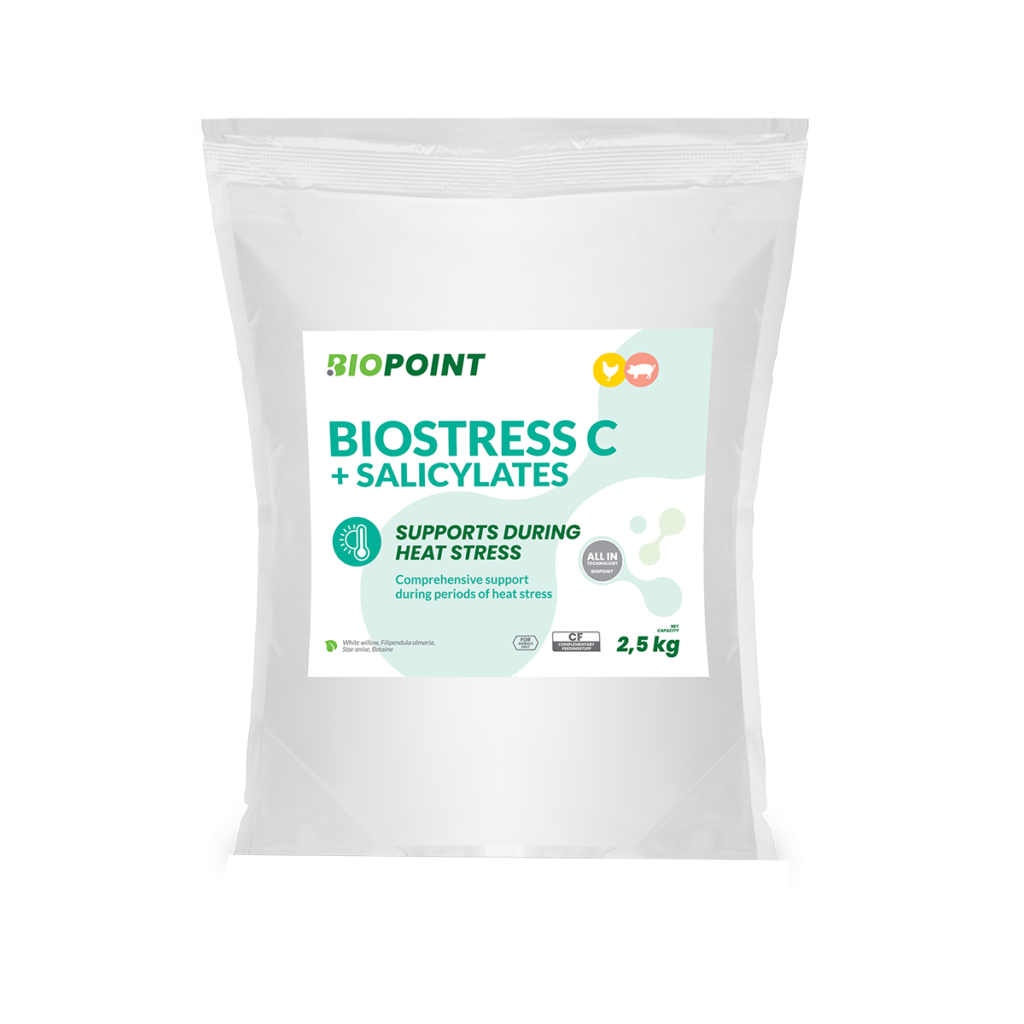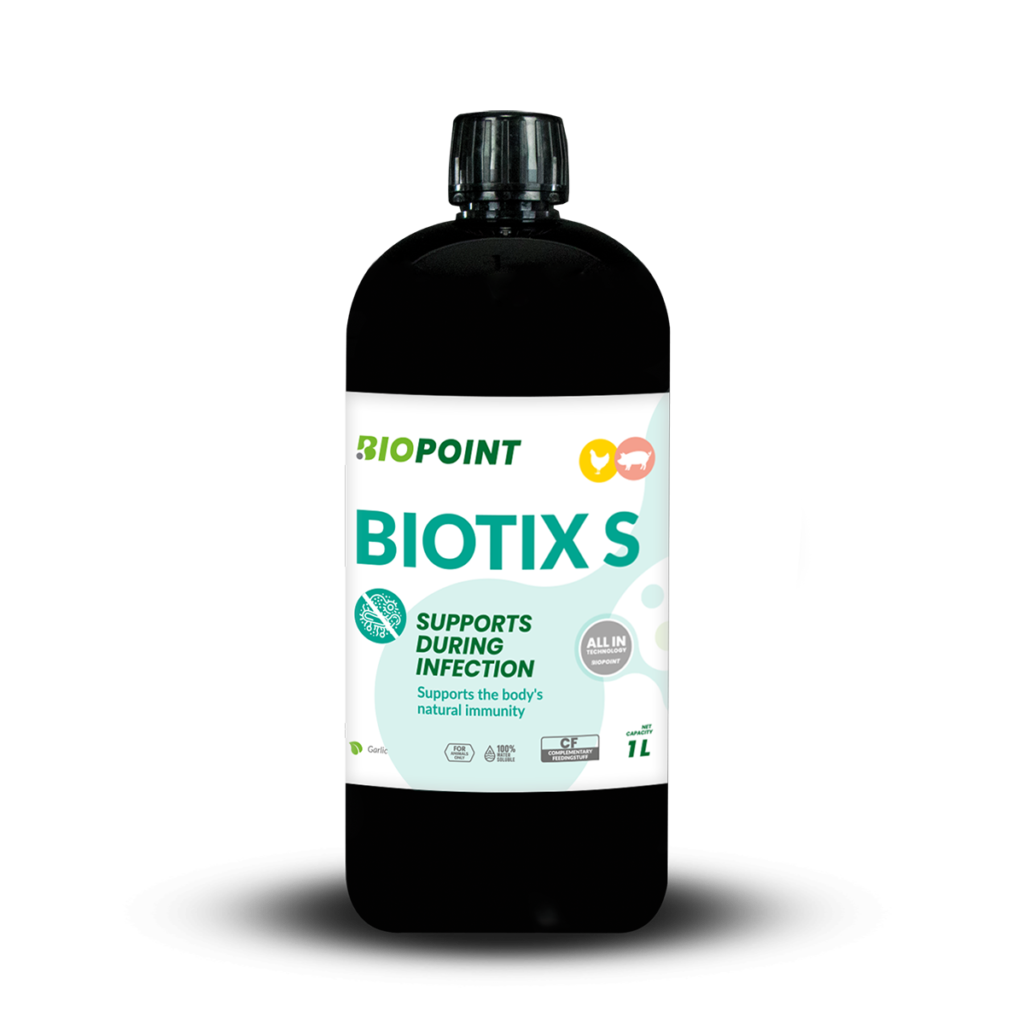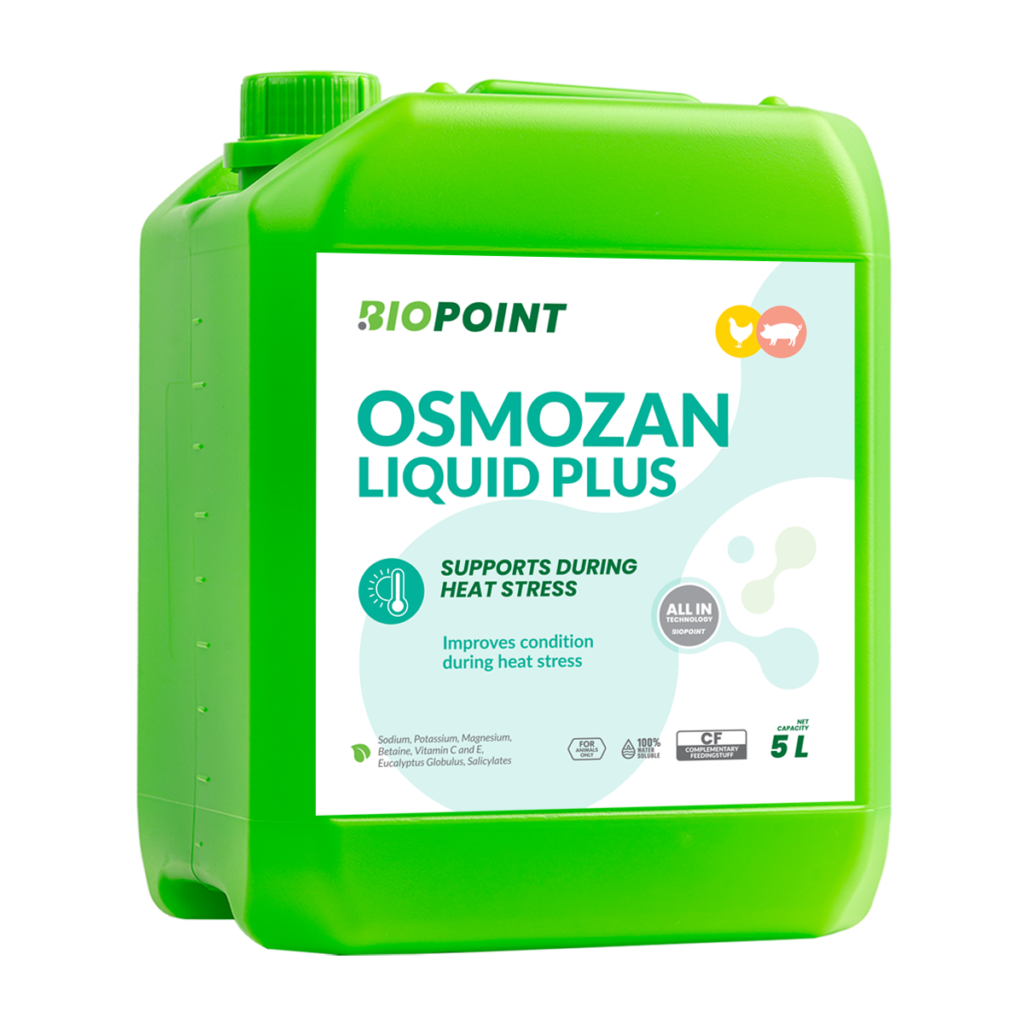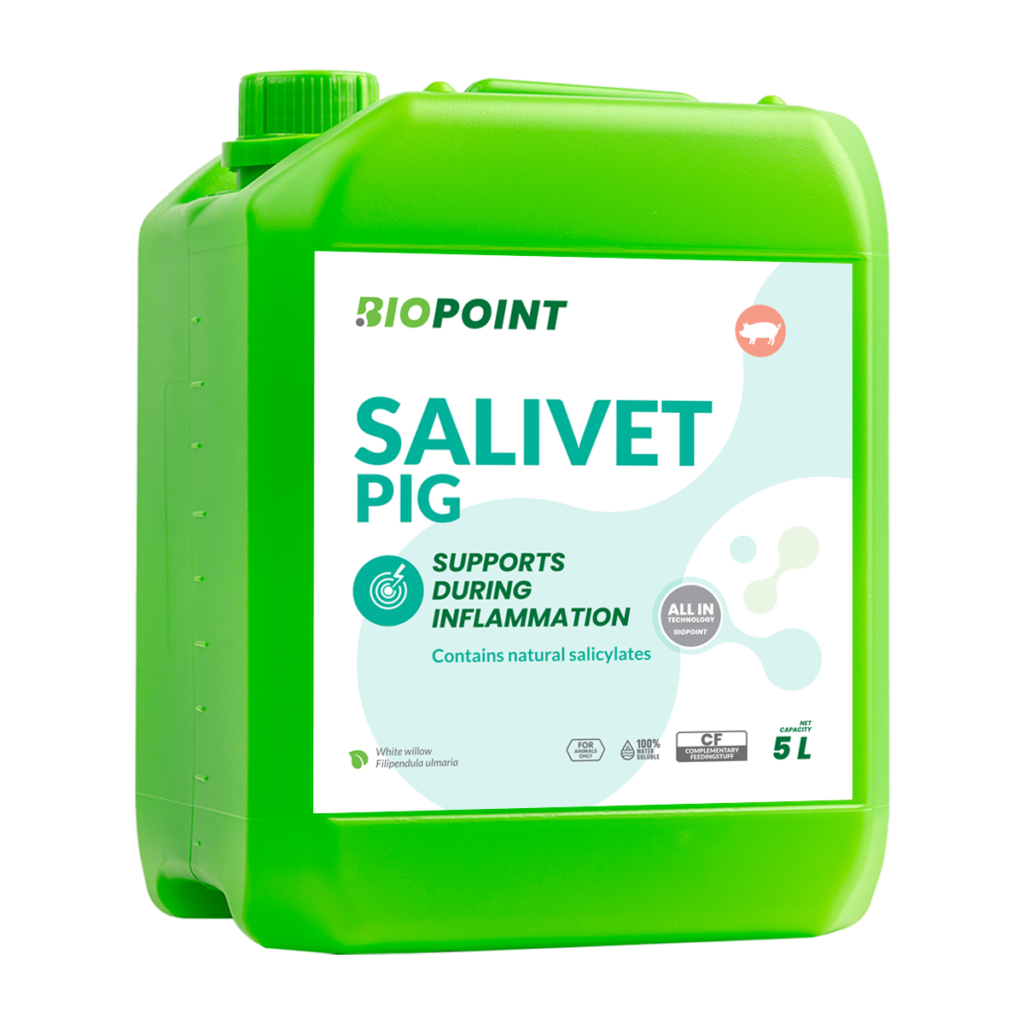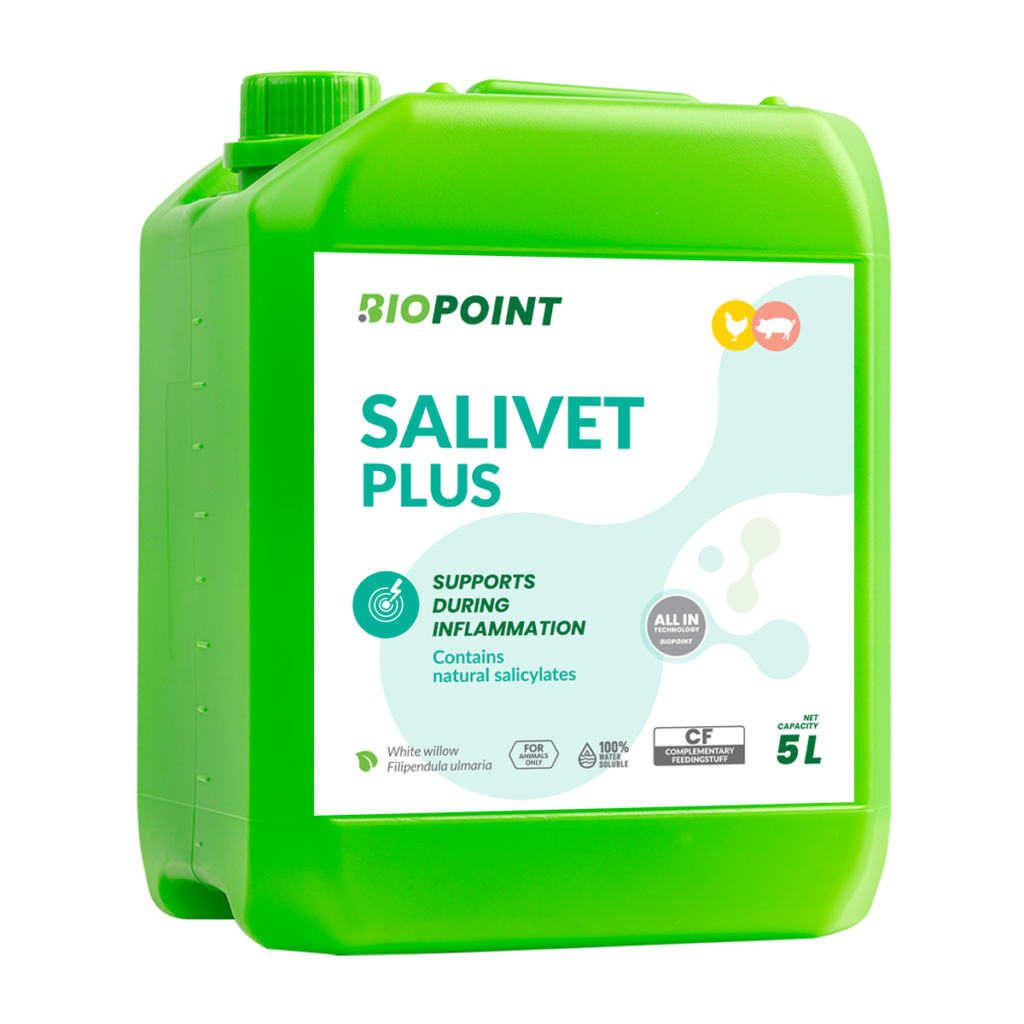
Respiratory system – Pigs
BIOTIX S
OSMOZAN LIQUID PLUS
Ask about the product
BioPoint - support for pigs in the proper functioning of the respiratory system
The respiratory system of swine is crucial for their overall health and productivity. In modern swine production, understanding and managing respiratory health is vital to maintaining the well-being of the herd and optimizing economic returns. This article delves into the complexities of respiratory infections in swine, exploring their economic impact, common pathogens, and effective prevention and treatment strategies. With a focus on sustainable practices, this piece also highlights how Biopoint's innovative feed additives can play a crucial role in enhancing respiratory health and immunity in swine.
Understanding Respiratory Infections in Swine
Respiratory infections in swine are a significant concern for farmers and veterinarians alike. These infections can rapidly spread through a herd, causing severe health issues and even mortality. The pathogens responsible for these diseases can be viral, bacterial, or a combination thereof, and they thrive in conditions where animals are stressed and closely confined. Early detection and accurate diagnosis are essential for effective management and control of these infections, requiring a thorough understanding of the symptoms and the dynamics of disease transmission within a herd.
Economic Impact of Respiratory Diseases
Respiratory infections can lead to substantial economic losses in swine production. The direct costs include veterinary expenses and medication, but the more significant losses often come from indirect impacts such as reduced weight gain, lower feed efficiency, and increased mortality rates. These factors cumulatively decrease the overall productivity of the farm. By affecting the growth and development of swine, respiratory diseases can compromise the economic sustainability of farming operations, making effective disease management and prevention strategies crucial.
Common Pathogens and Symptoms
The typical pathogens that cause respiratory diseases in swine include Porcine Reproductive and Respiratory Syndrome Virus (PRRSV), Swine Influenza Virus, and Mycoplasma hyopneumoniae, among others. These pathogens can cause symptoms ranging from coughing, sneezing, and difficulty breathing to more severe systemic effects like fever and lethargy. Early detection of these symptoms is critical, as timely intervention can significantly reduce the severity of the infection and its spread within the herd.
Prevention Strategies for Respiratory Health
Effective prevention of respiratory diseases in swine is multifaceted, involving both management practices and the use of specific health interventions like vaccination. Prevention strategies are aimed at reducing the risk of disease transmission and enhancing the overall immunity of the herd through a comprehensive approach that includes biosecurity measures, environmental management, and nutritional support.
Environmental Control Measures
Maintaining optimal environmental conditions is paramount in preventing respiratory illnesses. Good air quality, appropriate temperature and humidity levels, and adequate ventilation systems are essential to minimize the concentration of airborne pathogens and irritants, which can compromise the respiratory health of swine. Implementing these controls helps in creating a stress-free environment for the animals, thereby enhancing their resistance to infections.
Proactive Health Monitoring
Regular health checks and a well-structured vaccination program are integral to proactive respiratory health management in swine herds. Monitoring health parameters allows for early detection of potential outbreaks, facilitating swift action to isolate affected animals and treat them promptly. Vaccination plays a critical role in building herd immunity against prevalent respiratory pathogens, significantly reducing the incidence and severity of outbreaks.
Treatment Approaches for Respiratory Issues
Once respiratory infections are identified within a herd, prompt and effective treatment is crucial to control the spread and minimize economic losses. Treatment protocols typically include the use of antimicrobials for bacterial infections and supportive care for viral infections. However, the increasing concern over antimicrobial resistance has led to more judicious use of these medications. Integrating alternative treatments, such as immunomodulators and natural extracts, can complement traditional therapies, helping to enhance recovery rates and overall respiratory health.
Immediate Therapeutic Interventions
Immediate therapeutic interventions are necessary to manage outbreaks of respiratory disease effectively. This involves administering targeted treatments as soon as symptoms are observed, which can prevent the spread of the disease to other animals. Quick and decisive action reduces the duration and severity of the infection, thereby minimizing its impact on animal health and farm productivity. These interventions might include the use of specific antimicrobials, anti-inflammatories, and supportive treatments like fluid therapy and supplemental oxygen for severely affected animals.
Role of Feed Additives in Treatment
Biopoint's feed additives play a vital role in the treatment and management of respiratory issues in swine. These products are formulated to support the immune system and enhance the respiratory health of the animals. Ingredients such as antioxidants, amino acids, and specific vitamins can help reduce inflammation and support the healing of lung tissue, thereby improving the recovery rates of infected animals. Regular inclusion of these additives in the diet can also bolster the overall resilience of the herd against respiratory pathogens.
Impact of Environmental Conditions on Respiratory Health
The link between environmental conditions and the respiratory health of swine is well-established. Poor environmental conditions, such as inadequate ventilation, high ammonia levels, and extreme temperatures, can significantly increase the stress on animals, making them more susceptible to respiratory diseases. Effective management of these conditions is essential for maintaining a healthy respiratory system in swine populations.
Importance of Ventilation Systems
Proper ventilation systems are crucial in swine barns to ensure a continuous supply of fresh air and the removal of harmful gases and pathogens. These systems help to maintain an optimal climate within the barns, balancing temperature and humidity levels to suit the physiological needs of the swine. By reducing dust, pathogen load, and irritant levels in the air, well-designed ventilation systems can significantly decrease the incidence of respiratory problems.
Stress Reduction and Its Effects
Stress management is a critical component of respiratory health strategies. Stress in swine can be triggered by poor environmental conditions, overcrowding, and improper handling practices. Reducing stress through better management practices not only improves the overall well-being of the animals but also enhances their immune response, making them less vulnerable to infections. Strategies such as providing adequate space, ensuring comfortable bedding, and minimizing noise can contribute to a lower stress environment, promoting healthier respiratory systems.
Treatment Approaches for Respiratory Issues
Once respiratory infections are identified within a herd, prompt and effective treatment is crucial to control the spread and minimize economic losses. Treatment protocols typically include the use of antimicrobials for bacterial infections and supportive care for viral infections. However, the increasing concern over antimicrobial resistance has led to more judicious use of these medications. Integrating alternative treatments, such as immunomodulators and natural extracts, can complement traditional therapies, helping to enhance recovery rates and overall respiratory health.
Immediate Therapeutic Interventions
Immediate therapeutic interventions are necessary to manage outbreaks of respiratory disease effectively. This involves administering targeted treatments as soon as symptoms are observed, which can prevent the spread of the disease to other animals. Quick and decisive action reduces the duration and severity of the infection, thereby minimizing its impact on animal health and farm productivity. These interventions might include the use of specific antimicrobials, anti-inflammatories, and supportive treatments like fluid therapy and supplemental oxygen for severely affected animals.
Role of Feed Additives in Treatment
Biopoint's feed additives play a vital role in the treatment and management of respiratory issues in swine. These products are formulated to support the immune system and enhance the respiratory health of the animals. Ingredients such as antioxidants, amino acids, and specific vitamins can help reduce inflammation and support the healing of lung tissue, thereby improving the recovery rates of infected animals. Regular inclusion of these additives in the diet can also bolster the overall resilience of the herd against respiratory pathogens.
Impact of Environmental Conditions on Respiratory Health
The link between environmental conditions and the respiratory health of swine is well-established. Poor environmental conditions, such as inadequate ventilation, high ammonia levels, and extreme temperatures, can significantly increase the stress on animals, making them more susceptible to respiratory diseases. Effective management of these conditions is essential for maintaining a healthy respiratory system in swine populations.
Importance of Ventilation Systems
Proper ventilation systems are crucial in swine barns to ensure a continuous supply of fresh air and the removal of harmful gases and pathogens. These systems help to maintain an optimal climate within the barns, balancing temperature and humidity levels to suit the physiological needs of the swine. By reducing dust, pathogen load, and irritant levels in the air, well-designed ventilation systems can significantly decrease the incidence of respiratory problems.
Stress Reduction and Its Effects
Stress management is a critical component of respiratory health strategies. Stress in swine can be triggered by poor environmental conditions, overcrowding, and improper handling practices. Reducing stress through better management practices not only improves the overall well-being of the animals but also enhances their immune response, making them less vulnerable to infections. Strategies such as providing adequate space, ensuring comfortable bedding, and minimizing noise can contribute to a lower stress environment, promoting healthier respiratory systems.
Managing Heat Stress and Its Respiratory Implications
Heat stress is a significant environmental challenge that affects the respiratory health of swine, particularly in climates with high temperatures. It can exacerbate respiratory problems by compromising the animals' natural defense mechanisms and increasing their susceptibility to infections. Effective management of heat stress is critical to maintaining the respiratory wellness of swine, ensuring they remain productive and healthy during hot weather conditions.
Strategies to Combat Heat Stress
Implementing strategies to mitigate the effects of heat stress is essential for protecting swine from its detrimental impacts on respiratory health. Practical measures include providing adequate shade, using air humidifiers to maintain humidity at optimal levels, and ensuring continuous access to fresh water to help animals regulate their body temperature. Additionally, adjusting feeding schedules to cooler times of the day and using cooling systems like misters in barns can significantly reduce heat stress and its associated respiratory risks.
Impact on Respiratory Infections
Heat stress can lead to an increased risk of respiratory infections in swine by impairing lung function and reducing the effectiveness of the immune system. The stressed animals are more likely to contract airborne pathogens, leading to outbreaks of respiratory diseases within the herd. Understanding the correlation between heat stress and respiratory health helps in devising better management practices that protect swine from the heightened risk of infections during hot conditions.
Enhancing Immunity and Respiratory Health Through Supplements
Incorporating natural supplements into the diets of swine can play a pivotal role in enhancing their respiratory health and overall immunity. Supplements rich in antioxidants, electrolytes, and natural anti-inflammatory compounds can help strengthen the immune system and improve the animals' ability to fight infections.
Benefits of Natural Supplements
Natural supplements like salicylates, electrolytes, and antioxidants support the respiratory system by reducing inflammation and aiding in the recovery of lung tissue. These supplements also optimize the overall functioning of the immune system, making swine more resilient against respiratory pathogens. Regular inclusion of these supplements in the diet can lead to better health outcomes and reduced dependency on pharmaceutical interventions.
Biopoint’s Role in Respiratory Wellness
Biopoint’s feed additives are designed to support the respiratory health of swine by incorporating natural ingredients that boost immunity and lung function. These products are formulated based on scientific research to ensure they meet the nutritional needs of swine while enhancing their ability to resist and recover from respiratory diseases. By using Biopoint's additives, farmers can ensure their herds maintain optimal respiratory health, which is crucial for the sustainability and profitability of their operations.
Summary
The respiratory health of swine is a complex issue that requires a comprehensive approach encompassing prevention, treatment, and management of environmental factors. By understanding the economic impacts of respiratory diseases, identifying common pathogens, and implementing effective prevention and treatment strategies, farmers can significantly improve the health and productivity of their herds. Biopoint’s role in this process, through its innovative feed additives, underscores the importance of nutritional support in maintaining respiratory wellness in swine, ultimately leading to healthier animals and more efficient swine production operations.
